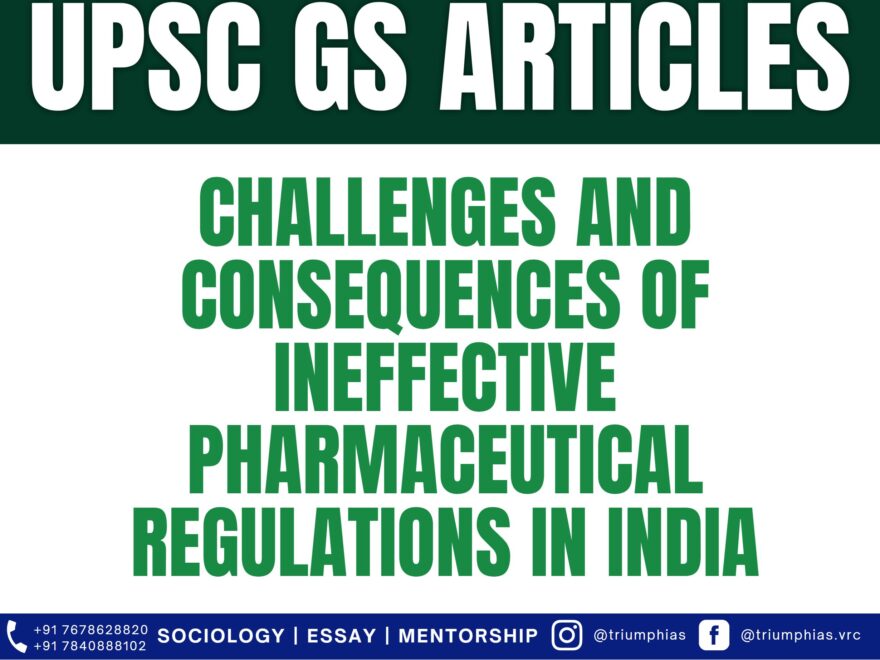Safety of Indian Drugs
(Relevant for General Studies Prelims and Mains Examination)

India holds a prominent position as one of the leading global producers and exporters of pharmaceutical goods, meeting approximately 20% of the worldwide demand for generic medications. It stands among the top 12 destinations for biotechnology on a global scale and ranks as the third-largest destination for biotechnology in the Asia Pacific region. Notably, India’s Biotechnology industry surpassed USD 80.12 billion in 2022, experiencing a 14% growth compared to the previous year.
The pharmaceutical industry in India has played a vital role in enhancing health outcomes and facilitating access to affordable medicines for millions of individuals globally, particularly in developing nations. However, this industry has also encountered allegations and instances of producing substandard, contaminated, or harmful drugs. These occurrences have resulted in adverse effects and fatalities among patients in various countries, including Sri Lanka, Gambia, Uzbekistan, and the United States.
These incidents have sparked significant concerns regarding the quality and safety of pharmaceutical products originating from India. They have also raised questions about the role and effectiveness of the Indian drug regulator in ensuring compliance with established standards and norms.
- The regulation of pharmaceuticals in India is overseen by the Drugs and Cosmetics Act of 1940, which is outdated and insufficient in addressing the intricacies and demands of the contemporary pharmaceutical market.
- The Act lacks provisions for various critical aspects, including clinical trials, bioequivalence studies, and good manufacturing practices, which are crucial for upholding the quality and safety of drugs.
- Additionally, the enforcement of the Act suffers from weaknesses and fragmentation due to its involvement of multiple authorities at both the central and state levels. This results in overlapping jurisdictions and responsibilities, further hindering its effectiveness.
- Furthermore, there exists a deficiency in human resources, infrastructure, financial resources, and technology required to conduct thorough inspections, testing, monitoring, and surveillance of pharmaceutical manufacturing facilities and products.
- The transparency of India’s drug regulatory body, the Central Drugs Standard Control Organization (CDSCO), is limited as it does not provide comprehensive information regarding its operations, procedures, results, etc., to the public or the media. There is a lack of mechanisms to assess the regulator’s effectiveness in combating the production and distribution of substandard or counterfeit drugs. Additionally, there is a lack of safeguards to ensure the independence, impartiality, and freedom from external influences or pressures from the government or the pharmaceutical industry. Instances of corruption, collusion, and conflicts of interest involving certain CDSCO officials and pharmaceutical companies have been alleged.
- Certain pharmaceutical companies in India fail to comply with the established regulations and standards for the production, testing, labeling, packaging, storage, and distribution of drugs. These companies engage in unethical or unlawful activities, including the use of substandard or counterfeit ingredients, the adulteration or dilution of drugs, the falsification or manipulation of data or records, and more, all in an effort to reduce expenses or maximize profits. Furthermore, these companies may lack awareness or understanding of the regulatory requirements and guidelines applicable to various markets or countries. They may also lack adequate quality control systems or mechanisms to identify and prevent errors or defects in their products.

Consequences of Ineffective Regulations
- The substandard quality and lack of safety in Indian pharmaceutical products pose significant risks to public health, potentially resulting in adverse consequences such as infections, allergies, organ damage, poisoning, and more, for individuals who utilize them.
- This can result in treatment ineffectiveness, drug resistance, complications, or even fatalities for patients grappling with chronic or life-threatening conditions like HIV/AIDS, tuberculosis, malaria, cancer, and others.
- The substandard quality and lack of safety in Indian pharmaceutical products can negatively impact the economic growth of the country by undermining the reputation and competitiveness of the Indian pharma industry on the global stage.
- As a result, Indian pharma companies may experience a decline in market share, revenue, and profits due to the imposition of bans, recalls, or rejections of their products by foreign regulators or customers.
- This, in turn, can lead to a decrease in foreign exchange earnings, employment opportunities, and investments in India’s pharmaceutical sector. Furthermore, it can expose the Indian pharma industry to legal repercussions and penalties for non-compliance with the laws and norms of other countries.
The government should provide incentives, recognition, support and guidance to the industry for complying with the standards and norms and producing high-quality drugs and encourage them to adopt voluntary self-regulation and quality certification schemes.
To master these intricacies and fare well in the Sociology Optional Syllabus, aspiring sociologists might benefit from guidance by the Best Sociology Optional Teacher and participation in the Best Sociology Optional Coaching. These avenues provide comprehensive assistance, ensuring a solid understanding of sociology’s diverse methodologies and techniques.
Best Sociology Optional Teacher, Best Sociology Optional Coaching, Sociology Optional Syllabus, India pharmaceutical industry, drug regulations, substandard drugs, safety concerns, regulatory challenges, consequences of ineffective regulations, healthcare risks, economic impact, quality certification, voluntary self-regulation

